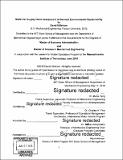| dc.contributor.advisor | Maria Yang and Charles H. Fine. | en_US |
| dc.contributor.author | Hillstrom, David (David P.) | en_US |
| dc.contributor.other | Leaders for Global Operations Program. | en_US |
| dc.date.accessioned | 2018-09-17T15:51:50Z | |
| dc.date.available | 2018-09-17T15:51:50Z | |
| dc.date.copyright | 2018 | en_US |
| dc.date.issued | 2018 | en_US |
| dc.identifier.uri | http://hdl.handle.net/1721.1/117965 | |
| dc.description | Thesis: M.B.A., Massachusetts Institute of Technology, Sloan School of Management, in conjunction with the Leaders for Global Operations Program at MIT, 2018. | en_US |
| dc.description | Thesis: S.M., Massachusetts Institute of Technology, Department of Mechanical Engineering, in conjunction with the Leaders for Global Operations Program at MIT, 2018. | en_US |
| dc.description | Cataloged from PDF version of thesis. | en_US |
| dc.description | Includes bibliographical references (pages 59-62 ). | en_US |
| dc.description.abstract | Li & Fung is a global, leading trading firm that connects manufacturing vendors with retailers. Li & Fung is responsible for the supply of beauty products, furniture, and apparel, with the majority of sales in the apparel category. Li & Fung has developed strong relationships with a large portion of global retailers and maintains a leading market position in the global garment market. Furthermore, Li & Fung leverages a complex supply chain of over 16,000 partner factories across 40 countries. These factories employ hundreds of thousands of workers who perform the difficult work of producing a variety of garments. This large footprint of factories and employees results in an equally large environmental footprint. Although it is well known that the environmental impact is substantial, with researchers stating that the apparel industry is one of the largest global polluters, it has been difficult to quantify the business impact as a whole, let alone the impact of a single garment. Through this internship, the objective was to quantify the environmental impact of factories and products. This quantification will enhance decision-making and arm the business with a toolset to help factories improve and drive down impact in a targeted manner. Furthermore, these quantifications are manifested in product level footprints and factory metrics calculated with the use of internally generated data and external data. The internal data provided much of the backbone for the analysis and its collection was completed through an internally developed, proprietary tool. External data was then gathered to address information gaps in the supply chain. Together this data formed the basis for Li & Fung's Environmental Assessment Tool. This tool provides potential benefits at all levels of the supply chain. In particular, it allows designers and customers to make informed decisions about product attributes that drive environmental impact, factories to compare their environmental impact against an appropriate peer group and make educated decisions, and Li & Fung to quantify their environmental impact and take steps to address environmental hotspots. | en_US |
| dc.description.statementofresponsibility | by David Hillstrom. | en_US |
| dc.format.extent | 76 pages | en_US |
| dc.language.iso | eng | en_US |
| dc.publisher | Massachusetts Institute of Technology | en_US |
| dc.rights | MIT theses are protected by copyright. They may be viewed, downloaded, or printed from this source but further reproduction or distribution in any format is prohibited without written permission. | en_US |
| dc.rights.uri | http://dspace.mit.edu/handle/1721.1/7582 | en_US |
| dc.subject | Sloan School of Management. | en_US |
| dc.subject | Mechanical Engineering. | en_US |
| dc.subject | Leaders for Global Operations Program. | en_US |
| dc.title | Multi-tier supply chain assessment of garment environmental sustainability | en_US |
| dc.type | Thesis | en_US |
| dc.description.degree | M.B.A. | en_US |
| dc.description.degree | S.M. | en_US |
| dc.contributor.department | Leaders for Global Operations Program at MIT | en_US |
| dc.contributor.department | Massachusetts Institute of Technology. Department of Mechanical Engineering | |
| dc.contributor.department | Sloan School of Management | |
| dc.identifier.oclc | 1051237777 | en_US |
